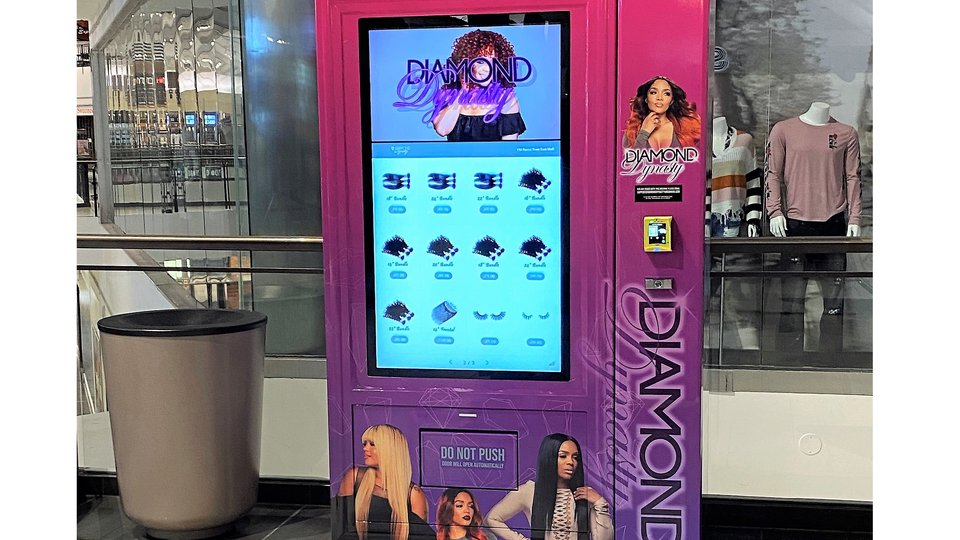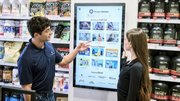Marketing
Hair care specialists tap e-commerce/self-service retail synergy
Three years after launching their e-commerce business, this entrepreneurial couple began placing vending machines to make their products available to people in shopping malls. They now have machines in eight states.

August 4, 2020 by Elliot Maras — Editor, Kiosk Marketplace & Vending Times
As consumers get in the habit of making more of their everyday purchases online, they still have occasions when they need something on the spot. You never know when you may need a hair curler.
After launching a successful e-commerce business for hair care products, the husband-and-wife team of Raquel and Stephon Brown realized that many of their customers needed hair care products on a moments' notice. That's when they decided to expand from a pure play e-commerce operation to vending machines.
Identifying a customer need
 |
| The Browns first used a glassfront snack machine to merchandise their products. |
Diamond Dynasty launched as an e-commerce site in 2014 based in Burlington, North Carolina, selling hair care products targeting African Americans. Products include wigs, weaves, lashes, clip ins, bundled hair extensions, head wraps, accessories and hair irons.
"I was just tired of paying so much for hair extensions that weren't good quality, so I started my own brand," Raquel Brown told Kiosk Marketplace. Both Raquel and her then boyfriend Stephon were undergraduate students at North Carolina Agriculture and Technical State University in Greensboro.
They both had part-time jobs after graduating college while they built their e-commerce business. Raquel worked at Dillard's in sales while Stephon worked as a sales assistant at a car dealership.
Diamond Dynasty became a popular destination for hair care products.
Despite only making up 14% of the U.S. population, African-Americans make up 85% of hair care sales, with six out of every ten African Americans wearing a wig, weave or extension, according to Diamond Dynasty's website
The couple is self-taught on social media marketing, which is its main marketing tool, in addition to the Google search engine. "Everything we know is by trial and error," Raquel said.
Knowing the customer experience
One of the most challenging issues they faced was delivery time. They use the U.S. postal service to deliver orders, which can take days to arrive, depending on the customer's location.
"I knew there was a need for having something on-demand," Raquel said. "There was a need for people to get hair extensions at the drop of a dime. A lot of our clients are last minute shoppers."
The couple explored vending machines online before selecting a glassfront snack machine which they customized with their own graphics. The machine was set up to only accept cash.
They placed their first machine in a shopping mall in nearby Greensboro, North Carolina, which is also the site of their office and warehouse where they package their orders.
They placed nine SKUs in the machine and serviced it themselves on a weekly basis. They were pleased with the sales and purchased another machine less than a year later at a location in Townson, Maryland, where a relative was able to service the machine.
The business has since expanded to include New York, New Jersey Georgia, Florida, Virginia and Texas. The couple did most of their own servicing, even for machines in other states. Service schedules range from weekly to monthly.
They did not wish to reveal how much they pay for monthly fees to the malls.
E-commerce/physical retail synergy
Diamond Dynasty demonstrates the synergy between e-commerce and vending as the Browns were able to determine where to place vending machines based on their highest concentrations of e-commerce customers.
"The reason we placed our machines in certain states is because those are the states that most of our customers are located," Raquel said.
The company grew to include 12 glassfront machines in eight states in less than three years before the owners began to look for a machine that could be monitored remotely.
The couple has since switched to using machines with remote monitoring capability that carry double the number of SKUs as the glassfront machine. Where prices range from $50 to $75 in the glassfront machine, they are as high as $125 in the digital machine.
They placed their first digital touchscreen machine in Mesquite, Texas. They actually fly to service this machine carrying the inventory in suitcases.
"When we're not paying anyone to man a store and doing it on our own, it's probably pretty much the same," she said when asked about the cost of having to fly to service a machine.
"We utilize our customer base," she said. "If we have a customer in a certain location, we will pay them a little bit to check it for us, send us a video of it, letting us know what's low, then we'll go out refill it, clean it, restock it," she said.
The digital machine only accepts credit cards, debit cards, Apple Pay and Android Pay.
The digital machine does more sales than the older glassfront machine, Raquel said, but with the card processing fees, the profitability is about the same as the older machines.
They have placed five digital machines, which have touchscreens that show the pictures of the merchandise as well as a video explains the products.
Next step: franchising
Last year, the Browns expanded into franchising after a franchise sales company, Franchise Creator, reached out to them. They already have two franchisees — in New York and Florida — who are both in the early stages.
"We're just waiting for things to get back to normal," she said, referring to the COVID-19 pandemic.
COVID-19 has not significantly affected the Barnes' own vending sales.
While the vending business is still much smaller than the e-commerce business, which ships about 300 orders per week, the couple sees major growth potential in the vending side.
The Browns hope to expand the franchise network to the West Coast and to other countries in the not-too-distant future.
In retrospect, they picked the right time to get into hair product retailing.
"The industry is super saturated now," Raquel said. "I'm glad we did start when we did."
Photos courtesy of Diamond Dynasty.
About Elliot Maras
Elliot Maras is the editor of Kiosk Marketplace and Vending Times. He brings three decades covering unattended retail and commercial foodservice.
 ChatGPT
ChatGPT Grok
Grok Perplexity
Perplexity Claude
Claude




